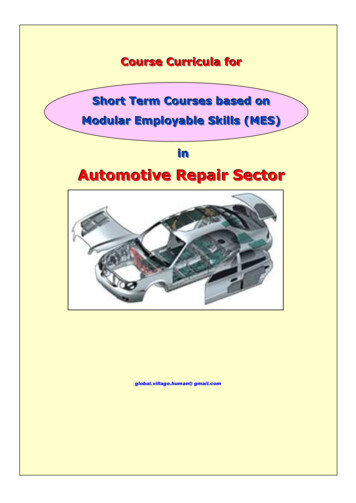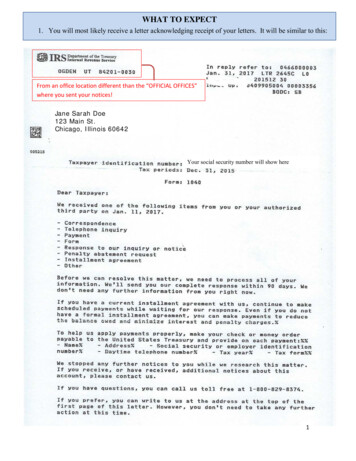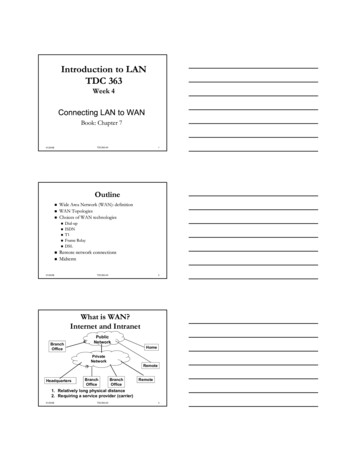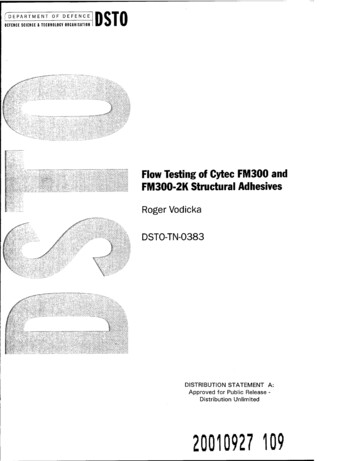
Transcription
CCoouurrsseeCCuurrrriiccuullaa ffoorrSShhoorrtt TTeerrmmCCoouurrsseess bbaasseeddoonnMMoodduullaarr EEmmppllooyyaabblleeSSkkiillllss ((MMEESS))iinnAutomotive Repair Sectorglobal.village.human@ gmail.com
Course Curricula for Short Term Courses based on ModularEmployable Skills (MES) in the Automotive Repair .Background .2Frame Work for Skill Development based on Modular Employable Skills .2Age of Participants .3Curriculum Development Process .3Development of Core Competencies .3Duration of the Programmes .4Pathways to acquire Qualification .4Methodology .5Instructional Media Packages .5Assessment .5Certificate .5Course Matrix .6Modules .7Basic Automobile Servicing of 2 & 3 Wheeler .7Basic Automotive 4 wheeler servicing .9Repair & Overhauling of Mopeds . 11Repair & Overhauling of Scooters . 13Repair & Overhauling of Motor Cycles . .15Repair & Overhauling of 3 Wheelers . .17Repair & Overhauling of Engine Systems (Petrol / diesel) . .19Repair & Overhauling of Chassis System (Light Vehicle) . 23Repair & Overhauling of Chassis System (Heavy Vehicle) . 27Repair of Auto Electrical & Electronics Systems . 31Repairing of Auto Air Conditioning System . . 34Wheel alignment & balancing . . .36Minor repair of Auto body . 38Auto body Painting . . .41Diesel Fuel Injection Technician . . 42Bicycle and Tricycle repair .45Sun Control Film Fixing .52Driver cum Peon .56.List of Expert/Trade Committee Members. . .511
Skill Development based on Modular Employable Skills (MES)BackgroundThe need for giving emphasis on the Skill Development, especially for the lesseducated, poor and out of school youth has been highlighted in various forums. The skilllevel and educational attainment of the work force determines the productivity, income levelsas well as the adaptability of the working class in changing environment. Large percentageof population in India is living below poverty line. One of the important causes is lowerpercentage of skilled persons in the workforceThe skill development at present is taking place mostly in the informal way, i.e.persons acquire skill at the work-place when they help their parents, relatives and employersetc. Such persons do not have a formal certificate and thus earn lower wages and areexploited by employers. They have come through informal system due to socio-economiccircumstances of the family and the compulsions of earning a livelihood rather thanattending a formal course. While their productivity is low, their contribution to the nationalGDP cannot be ignored. If the country can create a system of certification which not onlyrecognizes their skills but also provides education and training in a mode that suits theireconomic compulsions, it will not only benefit the workforce to earn a decent living but alsocontribute to the national economy by better productivity of this workforce.Another related problem to be tackled is large number of students drop outs (About63% of the school students drop out at different stages before reaching Class-X).Frame work for Skill Development based on ‘Modular Employable Skills (MES)’Very few opportunities for skill development are available for the above referredgroups (out of school youth & existing workers especially in the informal sector). Most of theexisting Skill Development programmes are long term in nature. Poor and less educatedpersons can not afford long term training programmes due to higher entry qualifications,opportunity cost etc. Therefore, a new frame work for Skill Development for the InformalSector has been evolved by the DGET to address to the above mentioned problems. Thekey features of the new frame work for skill development are: Demand driven Short term training courses based on modular employable skillsdecided in consultation with Industry Flexible delivery mechanism (part time, weekends, full time) Different levels of programmes (Foundation level as well as skill upgradation) to meetdemands of various target groups Central Government will facilitate and promote training while Vocational Training (VT)Providers under the Govt. and Private Sector will provide training Optimum utilisation of existing infrastructure to make training cost effective. Testing of skills of trainees by independent assessing bodies who would not beinvolved in conduct of the training programme, to ensure that it is done impartially. Testing & certification of prior learning (skills of persons acquired informally)2
The Short Term courses would be based on „Modular Employable Skills (MES)‟.The concept for the MES is : Identification of „minimum skills set‟ which is sufficient to get an employment in the labourmarket. It allows skills upgradation, multiskilling, multi entry and exit, vertical mobility and life longlearning opportunities in a flexible manner. It also allows recognition of prior learning (certification of skills acquired informally)effectively. The modules in a sector when grouped together could lead to a qualification equivalentto National Trade Certificate or higher. Courses could be available from level 1 to level 3 in different vocations depending uponthe need of the employer organisations. MES would benefit different target groups like :o Workers seeking certification of their skills acquired informallyo workers seeking skill upgradationo early school drop-outs and unemployedo previously child labour and their famillyAge of participantsThe minimum age limit for persons to take part in the scheme is 14 years but there isno upper age limit.Curriculum Development ProcessFollowing procedure is used for developing course curricula Identification of Employable Skills set in a sector based on division of work in the labourmarket.Development of training modules corresponding to skills set identified so as to providetraining for specific & fit for purposeOrganization of modules in to a Course Matrix indicating vertical and horizontal mobility.The course matrix depicts pictorially relation among various modules, pre requisites forhigher level modules and how one can progress from one level to another.Development of detailed curriculum and vetting by a trade committee and by the NCVT(Close involvement of Employers Organizations, State Governments, experts, vocationaltraining providers and other stake holders is ensured at each stages).Development of Core CompetenciesPossession of proper attitudes is one of the most important attribute of a competent person.Without proper attitudes, the performance of a person gets adversely affected. Hence,systematic efforts will be made to develop attitudes during the training programme.The trainees deal with men, materials and machines. They handle sophisticated tools andinstruments. Positive attitudes have to be developed in the trainees by properly guiding3
them and setting up examples of good attitudes by demonstrated behaviors and by theenvironment provided during training.Some important core competencies to be developed are:1. Safety consciousness and safe working practices2. Care of equipment and tools3. Punctuality, discipline and honesty4. Concern for quality5. Respect for rules and regulations6. Concern for health and hygiene7. Cordial relationship and Cooperation with co-workers and team Work8. Positive attitude and behavior9. Responsibility and accountability10. Learn continously11. Communication Skills12. Concern for environment and waste disposalFollowing competencies should also be developed during level-II and higher courses:1. Ability for planning, organizing and coordinating2. Creative thinking, problem solving and decision making3. Leadership4. Ability to bear stress5. NegotiationDuration of the ProgrammesTime taken to gain the qualification will vary according to the pathway taken and will be keptvery flexible for persons with different backgrounds and experience. Duration has beenprescribed in hours in the curriculum of individual module, which are based on the contentand requirements of a MES Module. However, some persons may take more time than theprescribed time. They should be provided reasonable time to complete the course.Pathways to acquire Qualification:Access to the qualification could be through: An approved training programme; OrA combination of an approved training programme plus recognition of priorlearning including credit transfer; OrThe recognition of prior learning that provides evidence of the achievement ofthe competencies for the qualification.4
MethodologyThe training methods to be used should be appropriate to the development of competencies.The focus of the programme is on “performing” and not on “Knowing”. Lecturing will berestricted to the minimum necessary and emphasis to be given for „hands on training‟.The training methods will be individual centered to make each person a competent one.Opportunities for individual work will be provided. The learning process will be continuouslymonitored and feedback will be provided on individual basis.Demonstrations using different models, audio visual aids and equipment will be usedintensively.Instructional Media PackagesIn order to maintain quality of training uniformly all over the country, instructional mediapackages (IMPs) will be developed by the National Instructional Media Institute (NIMI),Chennai.AssessmentDGE&T will appoint assessing bodies to assess the competencies of the trained persons.The assessing body will be an independent agency, which will not be involved in conductingthe training programmes. This, in turn, will ensure quality of training and credibility of thescheme. Keeping in view the target of providing training/testing of one million personsthrough out the country and to avoid monopoly, more than one assessing bodies will beappointed for a sector or an area.CertificateSuccessful persons will be awarded certificates issued by National Council for VocationalTraining (NCVT).5
Course MatrixProposed Course Outline/ PathwayCertificate-IIinAutomotiveRepair(Repair &Overhauling[R&O])Certificate-I inAutomotiveRepair(Fundamentals andServicing).R&O ofEngineSystems(petrol/diesel)R&O ofChassisSystem(Lightvehicle)R&O ofChassisSystem(Heavyvehicle)Sun Control FilmFixingAUR 117Repair ofAuto Airconditioning SystemMinorrepair ofAutobodyBasicAutomotiveServicing(4 wheelers)AutobodyPaintingRepair alignmentBicycle &TricyclerepairDieselFuelInjectionTechnicianR&O of R&O of R&O of R&O of2223wheelers wheelers wheelers wheelersmoped Scooter (Motorcycles)Drivercum peonAUR 118BasicAutomotiveServicing(2-3 wheelers)
Basic Automobile Servicing of 2 & 3 Wheeler Modules1. Module nameBasic Automobile Servicing of 2 & 3 Wheeler: Basic Automobile Servicing of 2 & 3 Wheeler2. Sector: Automotive Repair3. Code4. Entry Qualification5. Terminal competency: AUR102: Minimum 5th Std. , 14 years of Age: Successful candidate would be able to carryout minor repairs and routine servicing of 2& 3 Wheelers6. Duration: 180 Hours7. COURSE CONTENT:Practical Competencies Practice Health & Safety – select, use,maintain & store – tools, equipments &clothing safely Practice 5S technic Identify / Familiarize with the tools &equipments Identify components of 2 & 3 wheelerfrom assembly drawings & diagrams Water washing / cleaning of 2 & 3 wheelers Clean/replace air cleaner, fuel strainers andoil filters Drain & replenish lubricants Remove, clean, check, refit/replace – fueltank, fuel pipes, fuel tap operation Clean, Check and Adjust spark plug Replace brake components, adjust brake &top-up brake fluid Adjust clutch play Adjust, remove links & lubricate drive chain Replace control cables – clutch, brake &accelerator cables – adjust clutch & brakeplays Charge the battery Check pressure, inflate, measure tread depth,inspect for damage, do Wheel truing, Repairtyre puncture & Tuffe-up tube Check and replace bulbs Underpinning Knowledge (TheoryGeneral health & Safety precautions to be ob
repair of Auto body R&O of Chassis System (Heavy vehicle) R&O of 2 wheelers moped R&O of 2 wheelers (Motor cycles) Repair of Auto Air conditionin g System R&O of 3 wheelers Auto body Painting Wheel balancin g & alignmen t R&O of 2 wheelers Scooter Diesel Fuel Injection Technici an Bicycle & Tricycle repair Sun Control Film Fixing AUR 117 Driver











